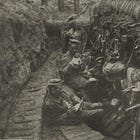The Russians Attack
Diary of a Stosstrupp Leader (Part 6)
This post continues a verbatim translation of the diary of a German soldier. The other posts in the series can be found with the help of the following guide.
15 October 1916
About 0930 am, the company commander ordered my squad to clear the mud out of an approach trench. I helped out with enthusiasm. We finished the job at 1:30 pm or so.
16 October 1916
We enjoyed a rest until noon. In the afternoon, we carried framing timber. The Russians hit us with drum fire (Trommelfeuer), which leveled the section of the trench occupied by the 1st Platoon.
We suffered from a shortage of ammunition, particularly hand-grenades and signal flares. My eight men and I ran back to the battalion ammunition depot through the heavy Russian artillery fire.
The enemy barrage was especially thick along the edge of the woods. (It seems that the Russians thought that we had assembled reinforcements there.) The Russians also subjected the woods to heavy machine gun fire.
Carrying 125 hand-grenades (five boxes, each with 25 grenades) and 50 signal flares - we began our return journey, which was made difficult by both the weight of the close-combat munitions we carried and the absence of any breaks in the enemy fire.
If a random splinter from an exploding Russian shell had hit one of our boxes of hand-grenades, all of the grenades would have detonated, tearing us to shreds.
We dug recesses in our trenches, thereby making protected, but accessible, places for storing hand-grenades, which played such an important role in close-combat, and signal flares, which we used to call for the all-important S.O.S. barrage.
We repelled the Russian attack!
to be continued …
Sources
The text comes from Alwin Lydding Meine Kriegstagbuch (My War Diary), unpublished manuscript, Bundesarchiv (German Federal Archive) N 382/1
The photo comes from Franz Schauwecker So War der Krieg (Such Was the War) (Berlin: Frundsberg Verlag, 1928) page 29
For Further Reading





